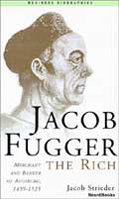|
|
|
|
||||||

|
Jacob Fugger the Rich: Merchant and Banker of Augsburg,
1459-1525
By Jacob Streider 2001/09 - Beard Books 1587981092 - Paperback - Reprint - 255 pp. US$34.95 The story of the Fugger family and the mighty business house they built in the fifteenth and sixteenth century in Germany. Publisher Comments
This fascinating biography of Jacob Fugger, the great German merchant and banker of the late fifteenth and early sixteenth century, is also an economic history of the golden age in German commercial history. Jacob Fugger was the embodiment of early capitalism. The Fugger family capitalized on family partnerships which led to joint stock companies and finally to the corporation. This book is recommended reading in many business courses. From Turnarounds and Workouts, May 15, 2002 Quick, can you work out how much $75 million in sixteenth century dollars would be worth today? Well, move over Croesus, Gates, Rockefeller, and Getty, because that's what Jacob Fugger was worth. Jacob Fugger was the chief embodiment of early German capitalistic enterprise and rose to a great position of power in European economic life. Jacob Fugger the Rich is more than just a fascinating biography of a powerful and successful businessman, however. It is an economic history of a golden age in German commercial history that began in the fifteenth century. When the book was first published, in 1931, The Boston Transcript said that the author "has not tried to make an exhaustive biography of his subject but rather has aimed to let the story of Jacob Fugger the Rich illustrate the early sixteenth century development of economic history in which he was a leader." Jacob Fugger's family was one of the foremost family in Augsburg when he was born in 1459. They got their start by importing raw cotton, by mule, from Mediterranean ports. They later moved into silk and herbs and, for a long while, controlled much of Europe's pepper market. Jacob Fugger diversified into copper mining in Hungary and transported the product to English Channel and North Sea ports in his own ships. A stroke of luck led to increased mining opportunities. Fugger lent money to the Holy Roman Emperor Maximilian I to help fund a war with France and Italy. Mining concessions were put up as collateral. The war dragged on, the Emperor defaulted, and Fugger found himself with a European monopoly on copper. Fugger used his extensive business network in service of the Pope. His branches all over Europe collected payments due the Vatican and issued letters of credit that were taken to Rome by papal agents. Fugger is credited with creating the first business newsletter. He collected news of evolving business climate as well as current events from his agents all across Europe and distributed them to all his branches. Fugger's endeavors wee not universally applauded. The sin of usury was still hotly debated, and Fugger committed it wholesale. He was sued over his monopoly on copper. He was involved in some messy bribes in bringing Charles V to the throne. And, his lucrative role as banker in the sale of indulgences, those chits that absolve the buyer of sin, raised the ire of Martin Luther himself. Luther referred to Fugger specifically in his Open Letter to the Christian Nobility of the German nation Concerning the Reform of the Christian Estate just before being excommunicated in 1521. Fugger went on, however, to fund Charles V's war on Protestantism and became even richer. Fugger built many churches and buildings in Augsburg. He was generous to the poor and designed the world's first housing project. These buildings and lovely gardens, called the Fuggerei, are still in use today. A New York Times reviewer said that Jacob Fugger the Rich, a book "concerned with the most famous, most capable, and most interesting of all [the members of the Fugger family] will be as interesting for the general reader as for the special student of business history." This observation is just as true today as in 1931, when first made. Jacob Streider was a professor of economic history at the University of Munich.
|
|
|
|
home
| about
us | contact
us | related
sites |